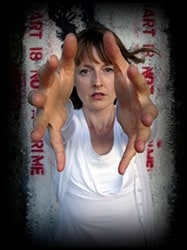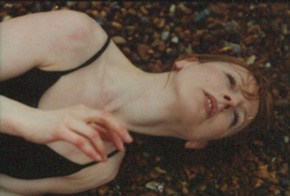Dance Movement Psychotherapy (DMP) is a unique form of psychotherapy in which the creative use of dance and movement plays a key role within the therapeutic relationship.
DMP is one of the four Arts Therapies and is regulated by the professional body, the Association of Dance Movement Psychotherapy (ADMP) and the government legislated Health Professions Council (HPC).
Uniquely, DMP focuses on embodied emotional expression through dance movement.
DMP integrates both verbal and non-verbal communication, since this reflects how we communicate as humans i.e. along a spectrum from language to non-verbal communication.
The DMP profession is influenced by contemporary psychological theories and psychotherapeutic and therapeutic practices, multi-cultural traditions in dance, bodywork and spiritual development, and is being continually informed by national and international research studies.
DMP is practised as both individual and group therapy, predominantly in education, health, social services and other community-based settings (e.g. voluntary and private organisations), prison services and in private practice.
DMP practitioners also work with international conflict resolution projects.
Salary
- The starting salary for newly qualified DMPs is £26,000 per annum.
- Senior practitioners and researchers can earn up to £55,000 per annum.
Responsibilities
Core responsibilities include:
- Maintaining an ethical code of practice (as defined by ADMP and HPC)
- Clinical note keeping from DMP sessions
- Being involved in client referral processes
- Attending regular clinical supervision (one hour for every 20 hours of practice)
- Session-specific responsibilities including maintaining time boundaries for the duration of the session
Qualifications
A postgraduate (MA or MSc) qualification is essential in order to become a Dance Movement Psychotherapist.
The duration of the training is 2-3yrs.
As part of the professional requirements, all trainee Dance Movement Psychotherapists must undertake personal individual psychotherapy.
A PhD is an additional qualification for those that are interested in pursuing research into the field and publishing.
Skills
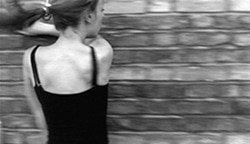
Core skills for becoming a Dance Movement Psychotherapist include:
- Ability to be empathic
- Ability to be reflective and then act upon this in order to change
- Fluency and sensitivity in dance movement and with words
- Interest in working with people
- Ability to work safely and provide a good enough ‘holding environment’ for others
- Ability to address own assumptions and prejudices about self and others
Working Conditions
Working conditions tend to vary according to the context.
For example, if a Dance Movement Psychotherapist is working on an in-patient psychiatric unit the session space may be a designated (at times carpeted) room.
Since the Dance Movement Psychotherapist works directly with bodies and emotions in a wide variety of contexts, both the physical and emotional demands of the job need to be recognised.
It is therefore important, indeed a professional requirement, that the therapist has regular supervision in order to support her/his practice.
The profession is female dominated; however, within the past three years the percentage of men entering the profession has increased.
Depending on which context the Dance Movement Psychotherapist is working in, hours tend to be within the standard eight-hour working day, especially within public services (e.g. the NHS, education, prisons etc).
However, where the therapist is working in private practice, this can include evening work.
DMP sessions tend to be indoors in a dance studio or in a space which can accommodate movement.
There are also practitioners who work outside in natural surroundings, mainly when conducting professional development workshops.
Experience
Extensive experience is required to become a Dance Movement Psychotherapist.
This experience comprises working with a range of different client groups within a spectrum of settings (e.g. NHS mental health services, schools, prisons etc) The initial qualifying experience can be gained through studying the MA in DMP.
There are currently six DMP professional training MA programmes in the UK.
Each programme is professionally accredited which means that upon successful completion newly qualified graduates can enter the profession at registered level.
Employers
- The UK National Health Service
- Social Services
- Universities
- Schools (mainstream and Special Needs)
- Prison Services
- International conflict resolution projects
- Arts projects
Career Progression
Most Dance Movement Psychotherapists have started out as professional dancers.
However, previous careers which have acted as a stepping-stone for current registered practitioners include nursing, teaching, medical practice and psychotherapy.
The key aspect to progressing as a Dance Movement Psychotherapist is an ongoing practice of dance movement (in a variety of styles or techniques).
Image
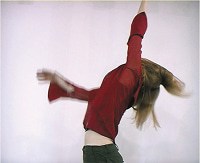
Also known as…
- Dance Movement Therapy
- Movement Psychotherapy
- DMP
Related Jobs
- Yoga Teacher
- Pilates Instructor
- Dance Teacher
- Art Psychotherapist
- Dramatherapist
- Music Therapist
What’s it really like?
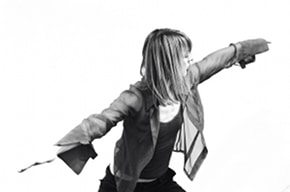
Beatrice Allegranti works as a Dance Movement Psychotherapist, choreographer, educator, academic researcher and writer.
As a senior practitioner, Beatrice has a small private practice in London as a Dance Movement Psychotherapist and clinical supervisor.
Her new book ‘Embodied Performances: Sexuality, Gender and the Body’ will be published by Palgrave Macmillan in 2011.
As a Dance Movement Psychotherapist with sixteen years of experience Beatrice’s clinical practice has involved facilitating therapy groups and one-to-one therapy within a wide range of settings: in outpatient adult mental health within the UK National Health System, for elderly adults with dementia in hospitals and assessment centres, with children who have a wide range of special educational needs as well as those on the autistic spectrum, with adults who have special educational needs, and more recently, with adolescents who have experienced trauma as a result of living in conflict zones around the world.
Beatrice is also an experienced facilitator for staff development and training and has worked with teachers, nurses, doctors, social workers, occupational therapists, actors, dancers and directors.
Hi Beatrice, how long have you been working as a Dance Movement Psychotherapist?
For just under 20 years.
I trained as a dancer and choreographer, then several years after my dance degree I went into training as a Dance Movement Psychotherapist.
Ever since then I’ve worked in parallel as a DMP and dancer.
What that’s meant in practice is that I’ve spent some of my time working for theatre and on film as a performing dancer and the rest of the time as a DMP working with others.
Some people don’t know about the profession as it is a relatively young one; it’s considered the baby of the art therapies, along with its older siblings – art, music and drama therapy.
DMP is a hybrid that brings together the medium of dance and the therapeutic process.
I spent many years working in the NHS with individuals who had mental health problems.
The core of my practice, whether it be DMP or performance, is an attention to and working with the body.
Could you tell us what Dance Movement Psychotherapy means in a practical sense and how you work with it?
My work combines feminist approaches to movement improvisation, psychotherapy, and performance.
For me, a core belief system is to encourage non-sexist and more egalitarian approaches to interpersonal communication within our communities and across a broad range of everyday life contexts.
As both artist and clinician my specialist area of research explores sexuality, gender, and power within the therapeutic relationship and for performance.
I use video, photographic image and live performance to explore a range of themes such as the nature of boundaries, the links between private and public performance, the extent to which all social action is ‘performance’, the way emotions are embodied, and the bodily expression of the self.
What did you do before this job?
I started dancing at a very young age and as soon as I went to school I went to a dance conservatory.
I’ve been involved in dance or Dance Movement Psychotherapy all of my life
What do you like about the job?
I like being with the group or an individual and working on that body level.
I like helping people to access ways in which they can be strong within their own selves and working to better their own lives.
I really enjoy the process of assisting people.
Is there anything you don’t like about being a Dance Movement Psychotherapist?
No, there’s never really anything I don’t like about what I do, apart from every day ups and downs that are part of being a human being.
What advice would you give to someone thinking of becoming a DMP?
Firstly to be prepared to work on yourself.
The only way I can really be of benefit to other people is to change myself and understand how that change comes about.
Be open to working with other people and their bodies and understanding that sometimes that’s a challenging process and sometimes that’s an incredibly rewarding process when change comes about.
What job do you think you might do after this role in terms of career progression?
Because I’ve been around for quite a while and because I’m involved in teaching and research and clinical practice, the next stage for me is to bring all those strands together.
I would like to bring all of these aspects together in one studio; the studio for me would be a centre for what I call embodied well-being.
It would have Pilates and Yoga as well as DMP and performance and body work.
Is there any other inside information that you could offer us?
A prerequisite of being a DMP is being able to engage with people and work with them in-depth.
